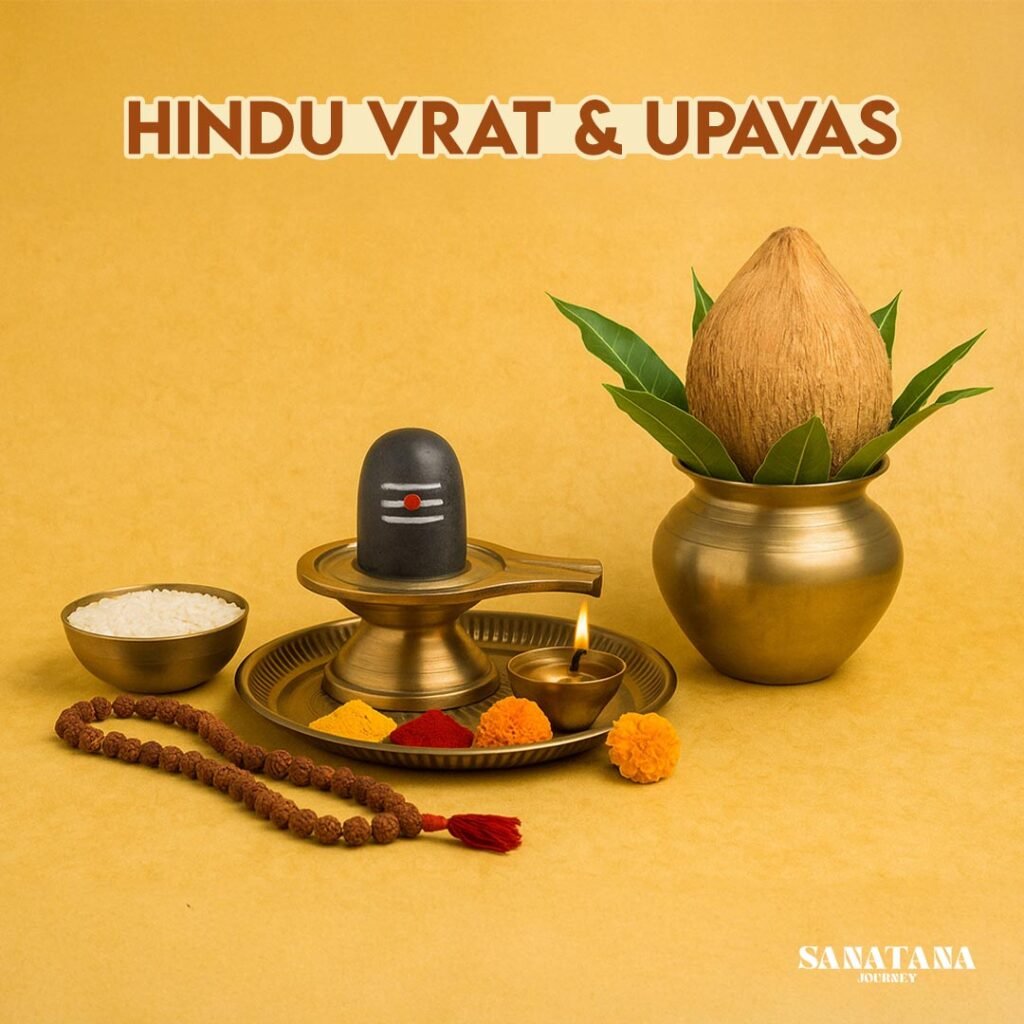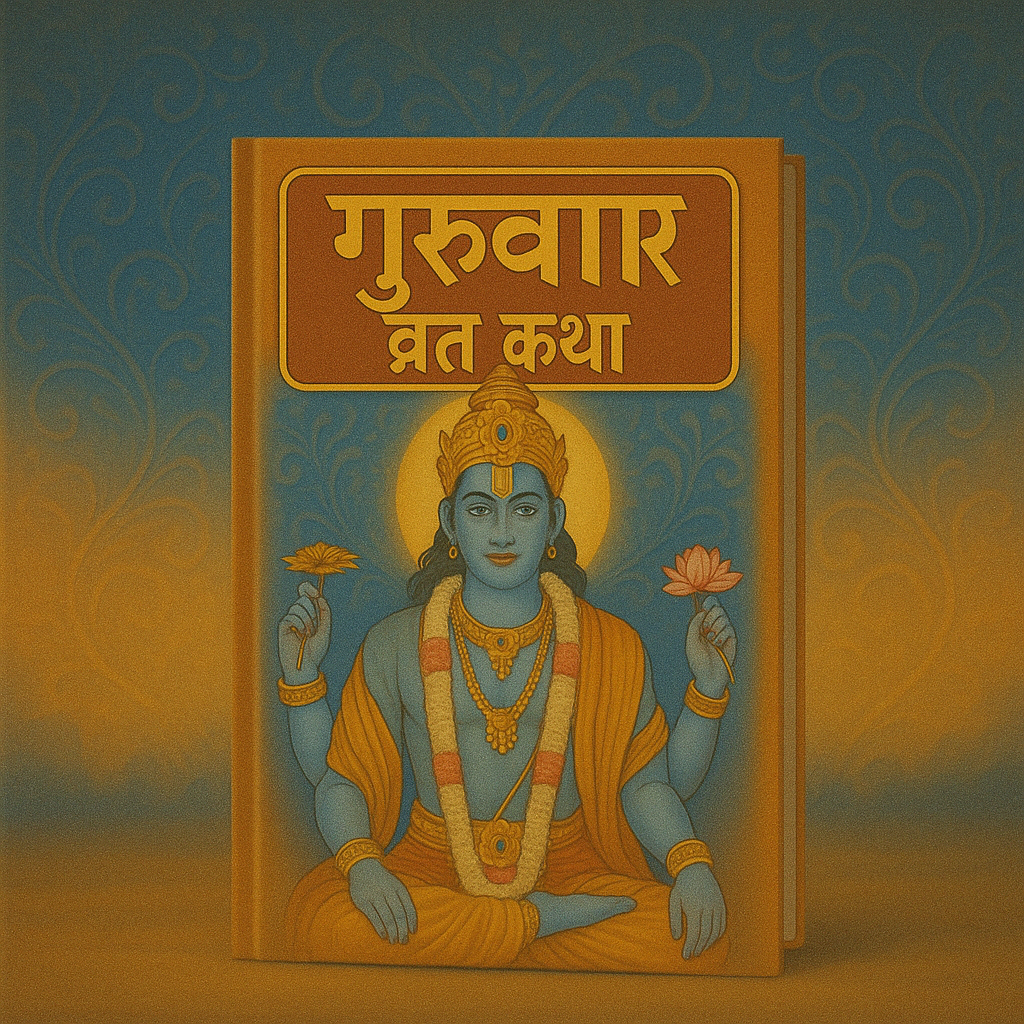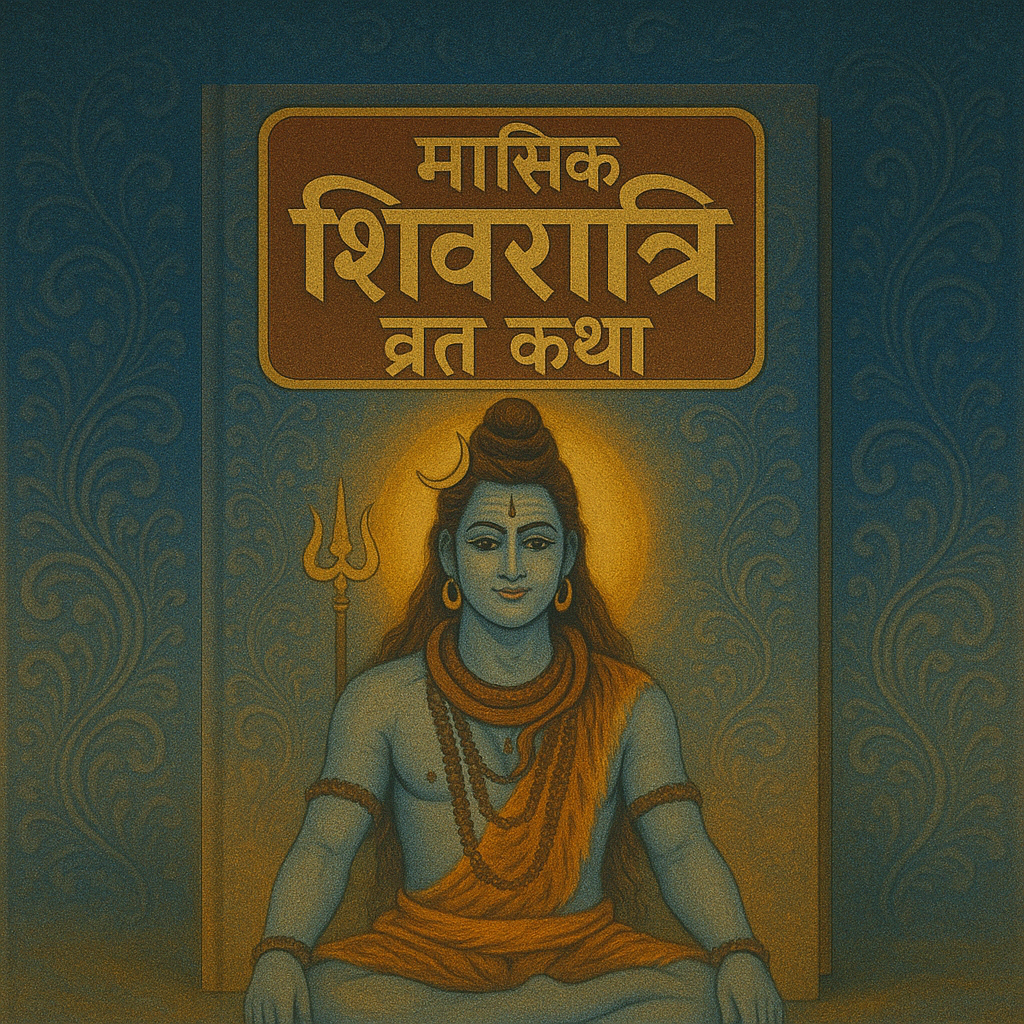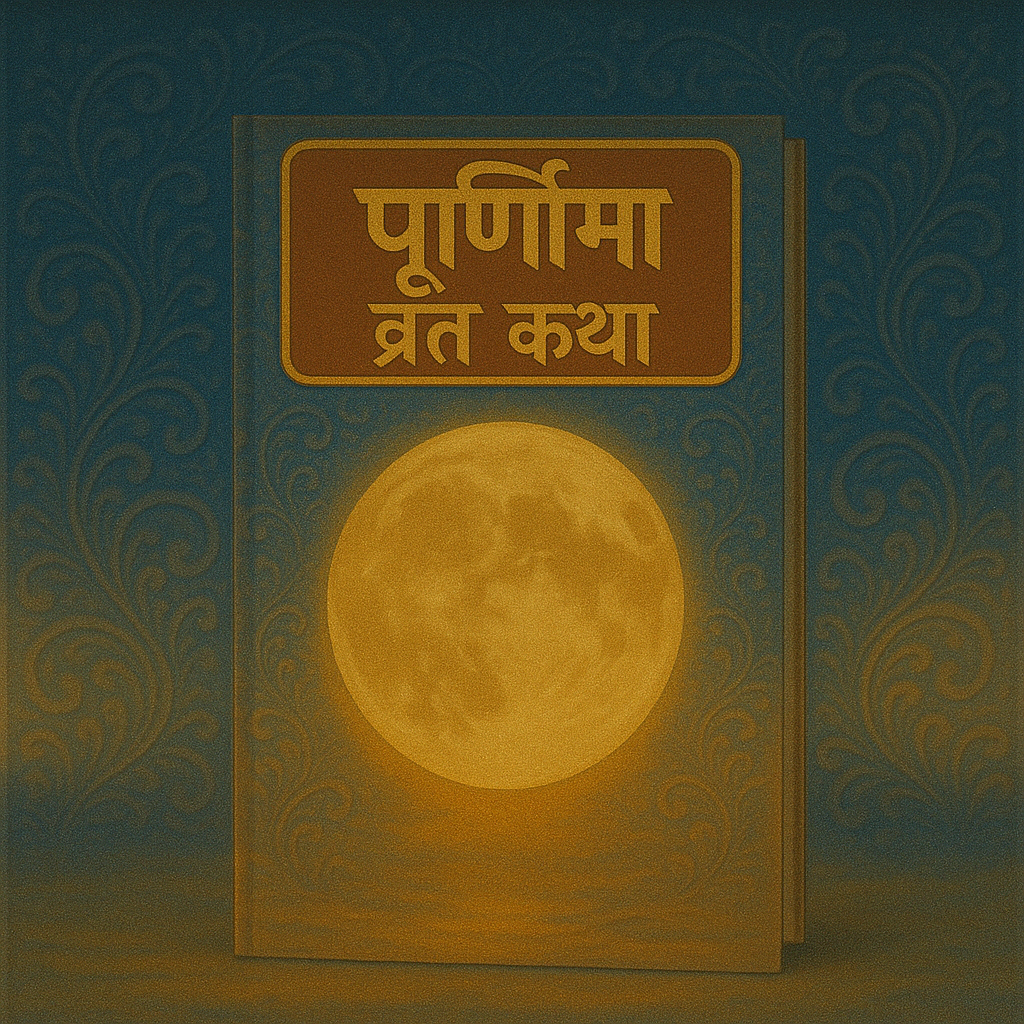

Hindu Fasting Days | Hindu Vrat List - Collection of Hindu Vrat and Upavas
“Fasting Days of Hindus”, the sacred tradition of fasting (Vrat), an integral part of Sanatana Dharma that combines discipline, devotion, and spiritual elevation. Observing fasts on specific days of the week is not just about abstaining from food—it is a conscious effort to connect with the divine energies associated with each day, aligned with specific deities and intentions.
Across India, devotees follow weekly fasting rituals from Monday to Sunday, each dedicated to a particular deity and purpose. These fasts are observed with great faith and discipline, often accompanied by prayer, puja, katha recitation, and acts of charity. For example, Monday (Somvar) is devoted to Lord Shiva, while Tuesday (Mangalvar) is for Hanuman or Durga Mata. Each day carries its own significance, benefits, and spiritual practices.
Collection of Hindu Vrat and Upavas
Fasting in Hinduism is more than abstaining from food—it’s a spiritual discipline that aligns your energy with divine deities associated with each weekday. Each Vrat (fast) is observed with faith, rituals, and unique intentions.
Hindu Fasting Days
- Somvar Vrat – Shiva’s blessings, peace, marital harmony
- Mangalvar Vrat – Strength, courage, protection, Durga grace
- Budhwar Vrat – Ganesha’s wisdom, business, communication clarity
- Guruvar Vrat – Knowledge, family harmony, Vishnu’s grace
- Shukravar Vrat – Wealth, prosperity, Lakshmi’s divine blessings
- Shanivar Vrat – Shani’s protection, karma cleansing, discipline
- Ravivar Vrat – Sun energy, health, radiant success
- Ekadashi Vrat – Vishnu’s grace, detachment, path to moksha
- Pradosh Vrat – Shiva’s worship, karma clearing, prosperity
- Amavasya Vrat – Ancestral healing, spiritual cleansing, renewal
- Purnima Vrat – Satyanarayan puja, blessings, spiritual growth
- Masik Shivratri Vrat – Monthly Shiva vrat, deep transformation
Sankashti Chaturthi Vrat – Ganesha’s blessings, obstacle removal, fortune

Somvar Vrat
Somvar Vrat is observed every Monday to worship Lord Shiva and seek his blessings for peace, health, and a happy life. Devotees fast, offer prayers, and visit Shiva temples. It is especially popular among those wishing for a good life partner or marital harmony.
- God Worshipped: Lord Shiva
- Day Observed: Monday
- Associated Color: White or Light Blue

Ravivar Vrat
Ravivar Vrat is observed on Sundays to honor the Sun God (Surya). Devotees fast to gain health, vitality, and success in life. The vrat is known to bring positive energy and cure ailments.
God Worshipped: Surya (Sun God)
Day Observed: Sunday
Associated Color: Red or Orange

Shanivar Vrat
Dedicated to Lord Shani (Saturn), this vrat is observed to reduce the ill effects of Shani dosha. Devotees light sesame oil lamps and offer black sesame seeds.
God Worshipped: Lord Shani
Day Observed: Saturday
Associated Color: Black or Dark Blue

Shukravar Vrat
Shukravar Vrat is kept for Goddess Lakshmi to gain wealth, prosperity, and harmony at home. Devotees wear white clothes and offer sweets and white flowers.
Goddess Worshipped: Goddess Lakshmi
Day Observed: Friday
Associated Color: White or Pink

Guruvar Vrat
This vrat is kept to please Lord Vishnu or Brihaspati (Guru). Observers fast and pray for wisdom, knowledge, and family happiness. Yellow food is often consumed.
God Worshipped: Lord Vishnu / Brihaspati
Day Observed: Thursday
Associated Color: Yellow

Budhwar Vrat
Fasting on Wednesday is done for Lord Ganesha or Mercury (Budh). It enhances communication skills, intelligence, and business success.
God Worshipped: Lord Ganesha / Budh Graha
Day Observed: Wednesday
Associated Color: Green

Mangalvar Vrat
Dedicated to Lord Hanuman or Mangal (Mars), this vrat is for strength, courage, and protection from enemies. Many avoid salt and wear red on this day.
God Worshipped: Lord Hanuman / Mangal Graha
Day Observed: Tuesday
Associated Color: Red

Karwa Chouth Vrat
This vrat is for Lord Shiva, promoting peace, good health, and a suitable partner. Devotees often fast with only fruits or milk.
God Worshipped: Lord Shiva
Day Observed: Monday
Associated Color: White or Light Blue

Sawan Somvar Vrat
Observed on Mondays during the holy month of Shravan, this vrat is considered extremely auspicious for pleasing Lord Shiva. Devotees fast and offer milk, bel patra, and water to Shiva Lingam for blessings.
- God Worshipped: Lord Shiva
- Day Observed: Mondays of Shravan month
- Associated Color: White or Light Blue

Sankashti Chaturthi
Observed on the 4th day after the full moon, this fast is for Lord Ganesha. It helps in removing obstacles and brings good fortune.
God Worshipped: Lord Ganesha
Day Observed: Varies (Chaturthi after full moon)
Associated Color: Red or Yellow

Masik Shivratri
This monthly Shivratri is observed on the 14th night of the waning moon to honor Lord Shiva. It is ideal for spiritual growth and divine blessings.
God Worshipped: Lord Shiva
Day Observed: Krishna Paksha Chaturdashi (Monthly)
Associated Color: White

Purnima
Falling on the full moon, Purnima vrat is considered holy and ideal for fasting and spiritual practices. It’s often linked to Satyanarayan puja.
God Worshipped: Lord Vishnu / Satyanarayan
Day Observed: Full Moon (Purnima)
Associated Color: White or Yellow

Amavasya
Observed on the new moon day, this vrat is significant for ancestral offerings and spiritual cleansing. Many perform tarpan or Pitru Puja.
God Worshipped: Ancestors / Lord Shiva
Day Observed: New Moon (Amavasya)
Associated Color: Black or White

Pradosh
Held twice a month on the 13th lunar day (Trayodashi Tithi), this vrat is for Lord Shiva. It ensures prosperity, health, and removal of past sins.
-
God Worshipped: Lord Shiva
-
Day Observed: Trayodashi (twice a month)
-
Associated Color: Light Blue or White

Ekadashi
One of the most important fasts, observed twice a month on the 11th lunar day, it is dedicated to Lord Vishnu. It brings spiritual purity and moksha.
God Worshipped: Lord Vishnu
Day Observed: Ekadashi (twice a month)
Associated Color: Yellow or White
Frequently Asked Questions
When to read Solah Somvar Vrat Katha?
Read it every Monday after puja during the 16-week Solah Somvar fast.
How to do Sawan Somvar Vrat?
Bathe early, offer milk and water to Shivling, chant mantras, read the vrat katha, and fast with fruits or simple food.
What is the Vrat Katha?
A sacred story recited during a fast, explaining its significance and blessings.
What is Krishna Katha?
Stories and teachings of Lord Krishna shared to inspire devotion and wisdom.
What is the purpose of Vrat?
To gain divine blessings, purify the soul, and strengthen faith.